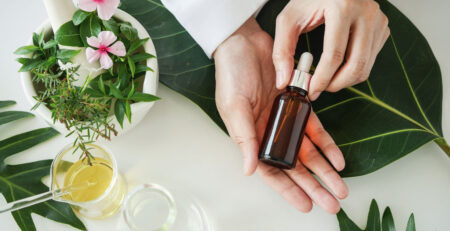7 Best Natural Ingredients For Your Skin
The beauty world is brimming with high-tech devices and cutting-edge ingredients, but when it comes to handling some of the most common skincare problems, newer isn’t always better. In some cases, simple natural options might be as effective as scientifically engineered solutions.
“Many of my patients practice ‘clean’ eating and want to extend that philosophy to their skincare routine,” says Papri Sarkar, MD, a dermatologist in Brookline, MA. “Finding effective clean beauty products isn’t as simple as finding organic produce at the grocery store, but it’s easier than ever before to find something that will fit your needs.”
We asked experts to share the ingredients that are the best of both worlds- naturally based and science-backed.
Coconut Oil
Benefits: Hydration, anti-inflammatory. There’s growing science supporting the use of this plant fat as a topical skin soother. Recent research shows that extra virgin coconut oil suppresses some of the body’s natural inflammatory agents while making the skin a better barrier. “Many people love coconut oil products to help fight dry, itchy skin and skin diseases such as eczema and psoriasis,” says Laurel Naversen Geraghty, MD, a dermatologist in Medford, OR. “Some of my psoriasis patients swear by overnight coconut oil scalp treatments worn under a plastic shower cap.” But Geraghty warns against putting coconut oil on blemish-prone areas because it may worsen acne.
Find it in: Jars in the cooking aisle.
Gotu Kola (Also Known as Centella Asiatica)
Benefits: Wound healing. This ancient herb often used in Asian cuisine is now a part of modern skincare due to its wound-healing benefits, says Michelle Wong, PhD, a cosmetics chemist and creator of the Lab Muffin Beauty Science blog. Chemicals in the plant boost blood supply to injury sites and strengthen the skin. Researchers have found that when skin injuries in rats are treated with Centella Asiatica, the sites showed higher healing. The combination of amino acids, beta carotene, fatty acids, and phytochemicals help speed healing time, making it a helpful way to treat injuries.
Find it in: Wong likes La Roche-Posay Cicaplast Baume B5 Soothing Repairing Balm and Dr Jart+ Cicapair Tiger Grass Cream.
Green Tea
Benefits: Sun protection, anti-aging. The connection between drinking green tea and improved health has been suggested for years, but it may also help to use the plant on the skin. “Green tea has good results in terms of photoprotection and anti-aging benefits,” says Jeanine Downie, a dermatologist in Montclair, NJ. The polyphenols in green tea have antioxidant properties as well as soothing abilities that help treat sun-damaged skin and offer a way to address the signs of sun damage, she says.
Find it in: Downie likes sunscreen containing green tea, such as Paula’s Choice Skin Balancing Ultra-Sheer Daily Defense Broad Spectrum SPF 30.
Oatmeal
Benefits: Anti-inflammatory, eczema relief. “Oatmeal contains anti-inflammatory and anti-irritant chemicals called avenanthramides,” Wong says. “It also has moisturizing beta-glucans and starches. It’s the reason why oatmeal baths are so effective for conditions like eczema and rashes.” But not all oatmeal is created equal, Geraghty says. “Colloidal oatmeal is a powder that’s derived from grinding and preparing oats into very tiny, specific sizes,” she says. This size and quality of oats is what makes the ingredient so therapeutic and able to blend with water to form the soothing paste when mixed with water
“I like colloidal oatmeal products because they’re gentle and safe, and studies show they don’t tend to cause allergies or irritation,” Geraghty says. “I’ve found that if my eczema patients develop gentle skincare habits and regularly slather on a thick moisturizer containing colloidal oatmeal, they don’t need topical steroids as much or as often.”
Find it in: Wong likes Aveeno colloidal oatmeal products like their Soothing Bath Treatment.
Shea Butter
Benefits: Anti-inflammatory, itch relief. Derived from the nut of a shea tree, shea butter is an ingredient in many moisturizers. “It seems to hydrate the skin effectively because it’s loaded with fatty acids,” Geraghty says. These nutrients have a calming and anti-inflammatory effect on the skin. She says shea butter might be most useful for treating and soothing eczema. Clinical studies using shea butter as a treatment for eczema in children showed less itching within 4 weeks, and another study with adults showed improvement in 2 weeks. Geraghty points out another plus of the natural moisturizer: Shea butter doesn’t seem to cause skin allergies often, which makes it right even for the most sensitive skin types.
Find it in: Geraghty likes Dove Cream Oil Shea Butter Body Lotion ($6) and L’Occitane Pure Shea Butter.
Soy
Benefits: Inhibits pigmentation, improves collagen production. Soybeans contain a variety of plant-based chemicals that impact the skin. Among them are antioxidants, fatty acids, and isoflavones. The legume also produces estrogens or phytoestrogens that address skin conditions related to menopause.
“One of the reasons we believe that a woman’s skin turgor and brightness decreases after menopause is because of decreased estrogen,” Sarkar says. “Topical estrogens have been shown to help decrease UV-induced pigmentation and can improve collagen synthesis.” She says soy won’t offer as robust results as retinoids, but it’s another option for patients looking to address these conditions. The isoflavones in soy also offer sun protection that can help address pigmentation to keep skin even, according to research.
Find it in: Sarkar likes Aveeno Positively Radiant Daily Moisturizer.
Tea Tree Oil
Benefits: Anti-microbial, blemish-fighting. The herbal remedy derived from tea tree leaves has antimicrobial and anti-inflammatory effects that help combat a range of germs, fungus, and bacteria, Geraghty says. “The fact that tea tree oil helps combat bacteria-driven acne means it may help reduce the inflammatory type of blemishes — the tender pustules or inflamed pink papules,” she says. But the topical treatment doesn’t have much effect against deep cystic acne or comedones. Geraghty also warns about the potential for irritation when using tea tree oil on the skin. She suggests monitoring areas for signs of redness and a rash.
Find it in: Geraghty likes Biossance Squalane + Tea Tree Detox Mask.
A Final Note
As is the case when trying any new treatment, it’s a good idea to run something by your dermatologist to make sure you’re using a natural therapy the right way, Geraghty says. “Coconut oil can worsen breakouts, for example, and some treatments are completely unproven- they wouldn’t be worth it.”











